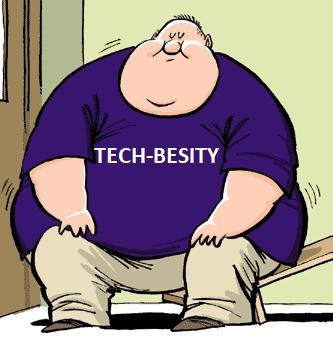We’ve exited the Holiday Season in the US. Thanksgiving, Hanukah, Kwanzaa, Christmas, the New Year are all past, we are anxiously setting goals for the New Year. We’ve probably overindulged, we have the guilt feelings and decide to go back to the gym, maybe hire a personal trainer.
Imagine walking into the gym, looking for a personal trainer. There are two to select from. One’s morbidly obese. He’s planted in a chair–possibly two, he struggles to stand, huffs and puffs to walk you around the gym, can’t demonstrate any of the exercises you should be doing. He starts wheezing, cuts the tour short, you go back to his desk. As he wipes the sweat off his brow, catches his breath, he asks you, “What are your fitness goals, how can I help you, when do you want to start?”
The other one is reasonably fit—not musclebound or a former Olympian, just in reasonably good shape. She walks you around the gym, demonstrates a few exercises that might be helpful, talks about diet, hydration, sleep. Perhaps she gives you the opportunity to try a few things, offering helpful advice about improving your form. Like the other trainer, you go back to her desk, she asks, “What are your fitness goals, how can I help you, when do you want to start?”
Who are you going to choose?
My money is on 99.99% of you selecting the second trainer. Why? Because she’s setting a great example of what you might achieve. She might inspire you to train more seriously, to become much better, and to achieve your goals.
Hold onto that mental picture, let me shift you to my inbox—probably yours as well.
Every morning, it’s filled with dozens of emails from vendors of sales and marketing automation tools or services. They are from respectable, sometimes enormous companies. But they all fit exactly the same pattern.
I’ve randomly chosen one from this morning as an example:
“Hello Dave, In less than 3 minutes (link deleted), transform the way you think about sales learning.
[Video Link Deleted] (yes, the video is a meaningless, “we are the greatest, you need to buy our product.”)
Best Regards, Ashley”
At least it was short, most drone on and on for several paragraphs of drivel! But it’s totally meaningless to me. It doesn’t address challenges we might face, how they might help, why I might want to care. It’s just “see my product, buy my product.”
I get dozens of these from vendors of marketing and sales automation tools every day. Most aren’t personalized, or personalized incorrectly, at least 90% are mis-targeting me, they don’t understand who I am or what my company does, or what we are concerned about. Most focus on inflicting descriptions of their products on me. And of course, I know I will get at least 8 of these emails, usually with (Re: Re: Re: Re;) in the subject line, reminding me of the previous email and asking me to invest my time in letting them tell me about their product.
Many are inevitably followed up by calls from SDRs, all of whom have the singular goal of getting me to accept a demo. They don’t know who I am, what our business is or why we might have a need. They can’t answer most of my questions, they defer them. They just want me to agree to a demo.
As I read these emails, they remind me of the morbidly obese trainer. All of them are the worst possible examples of sales and marketing execution. Most are terrible examples of the use of their own tools.
None of them give me confidence, none of them inspire me by the great examples they set. None of them get me thinking, “Maybe they can help me achieve my goals.”
Instead, they barely manage to cough out the words, “see my product, it’s the greatest, buy my product.”
As I read through these things, I always think, “Is this a great example of marketing and sales excellence?” “Is the way they present, market, and sell themselves, the way they would recommend as outstanding process for us to implement with our customers?”
Every time, the image of this morbidly obese trainer comes to mind. I quickly junk the email (so I can block the 7 that I know will follow), making a mental note to steer as far away as possible (as well as to advice clients to exercise great caution).
If we want to excite people about our marketing and sales automation tools and services, then we should set the highest standard of execution in how we market and sell them. That example and the results produced serve to inspire prospects and customers to think, “Maybe I can achieve the same.”
Which strategy are you executing, are you the morbidly obese trainer, struggling to inspire your customers, are are you the fit trainer, setting a great example of what could be achieved?

Leave a Reply